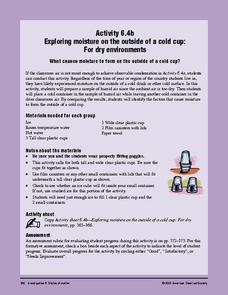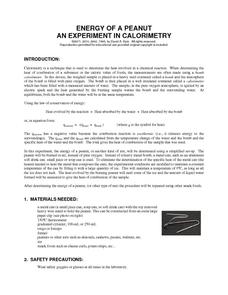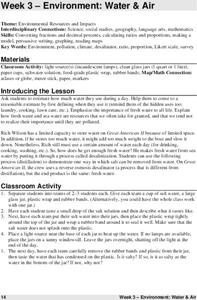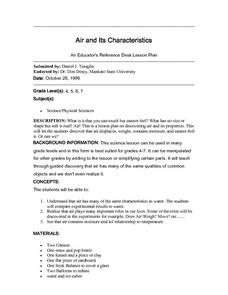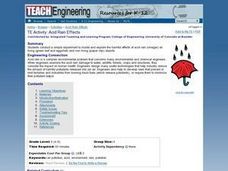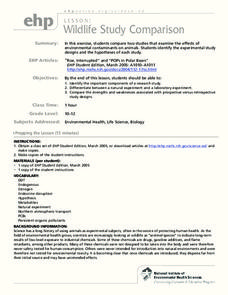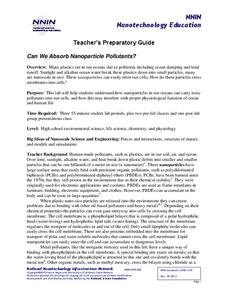American Chemical Society
Exploring Moisture on the Outside of a Cold Cup: For Dry Environments
If the area you live in is arid, or the preceding experiment in this unit didn't yield obvious results, use this one in place of it to help reveal where condensation comes from. The mini unit that this is part of a comprehensive...
American Chemical Society
Changing State: Condensation
When you have a cold drink and you notice the water forming on the outside, it is literally pulling the water from the surrounding air to form the condensation. After watching a demonstration of condensation forming on a glass,...
Kenan Fellows
Sensors in Chemistry
The Environmental Protection Agency monitors sensors to track air pollution and set clean air standards. Enthusiastic young scientists use similar sensors to gather data in their area and then apply the gas laws and conservation of...
Captain Planet Foundation
Square Foot Fall Garden
First graders learn the basic needs of plants and identify geometric shapes while planting a fall garden. Combining math and science in one activity, the resource guides kids through starting their class garden as they...
Cornell University
Buoyancy
Swimmers know to float by turning their bodies horizontally rather than vertically, but why does that make a difference? In an interesting lesson, scholars explore buoyancy and the properties of air and water. They test cups to see which...
Chymist
Energy of a Peanut
Are you nuts? An engaging experiment burns nuts to find their kilocalories. Young chemists analyze at least two different types of nuts with their experimental results versus what is on the package. The resource offers a great lab...
Science Matters
Thermal Energy Flow in Materials
The sun sends the earth 35,000 times the amount of energy required by all of us on the entire planet, every day. The fourth instructional activity in the 10-part series looks at how light energy from the sun transfers into thermal...
Curated OER
Oxygen vs. Air Pressure
Students perform an experiment to show that water level is affected by air pressure.
Curated OER
Environment: Water & Air
The introduction to the activity mentions a sailor's limited capacity to store drinking water on his ship. Pupils then set up an overnight experiment to remove freshwater from salt water by distillation. There is a math and map activity...
Curated OER
How Does the Air Get Polluted?
Students listen to or read a story that introduces awareness of environmental issues and in particular pollution.
Micron Technology Foundation
Early - Weather and Seasons
Young scientists from any region can take a scientific journey and be exposed to weather changes that include rain and snow.
Virginia Department of Education
Partial Pressure
At some point, everyone has been under pressure—even Dalton! Explore Dalton's law of partial pressures with young chemists as they measure the volume of air extracted from a sample compared to its original volume. Class...
Curated OER
NUMB3RS - Season 2 - "Convergence" - Air Hockey
Learn how to use a matrix to organize data to solve a problem. This activity uses wins and losses to rank players for an air hockey tournament they wish to have. After practicing some basic matrix operations the class could do the...
Virginia Department of Education
The Germ Theory and Koch’s Postulates
Explore the history of cholera and its effect on society with your biology class. Young biologists will then proceed to grow their own germs, prepared from live cultures, and follow the steps of the scientific method to generate data....
Curated OER
Air -- Is It Really There?
Students work together to perform simple experiments discovering the properties of air. They share their results with their classmates. They examine how engineers use the properties of air to clean the air of pollutants.
Curated OER
Air and Its Characteristics
Young scholars explore air through guided discovery. In this air lesson, students will observe three demonstrations about air. They will answer leading questions as they observe how air displaces and takes up space, how air has weight,...
Curated OER
Air: It's a Gas!
Learners investigate the properties of air through hands-on activities in conjunction with the demonstrations in a 3-2-1 Contact Video.
Curated OER
Science-Observation Skill Builders
Pupils explore observation while making connections between observation skills and careers (like how farmers observe the weather). They view a variety of nature photographs on the computer and practice their observation skills by...
Curated OER
The Cloud Case
Learners discover how clouds form and how air pressure and air temperature affect their formation. The instructional activity is delivered in the story of Mike Breezy, Air Detective, who tries to solve The Cloud Case.
Curated OER
Acid Rain Effects
Get out the goggles and conduct a simple experiment to model and explore the harmful effects of acid rain (vinegar) on living (green leaf and eggshell) and non-living (paper clip) objects. Young chemists observe and describe the harmful...
Curated OER
Wildlife Study Comparison
Environmental science classes read articles about two different scientific studies. One is about the effects of contraceptive chemicals on fertility, and the other is about how a pesticide may be reducing bone density in exposed...
National Nanotechnology Infrastructure Network
Can We Absorb Nanoparticle Pollutants?
Just because we can't see it doesn't mean it isn't there! A growing concern for environmental scientists is toxic nanoparticles in our air and water. Young scholars conduct an experiment to demonstrate how these particles can cross our...
Curated OER
Lesson Plan Outline for Rainbow Science
Young scientists study light reflection and refraction as they determine the critical angle, the rainbow angle, and color separation in rainbows. Teams record the data they collect in a shared spreadsheet and discuss results with the class.
Curated OER
By Bernoulli, Where's Gravity?
Students observe a 1/4 inch by 2 inch piece of paper that is held vertically downward under the bottom lip, noting that the paper is pulled down by gravity. They predict what happens to the paper if air is blown out. After air is blown,...
